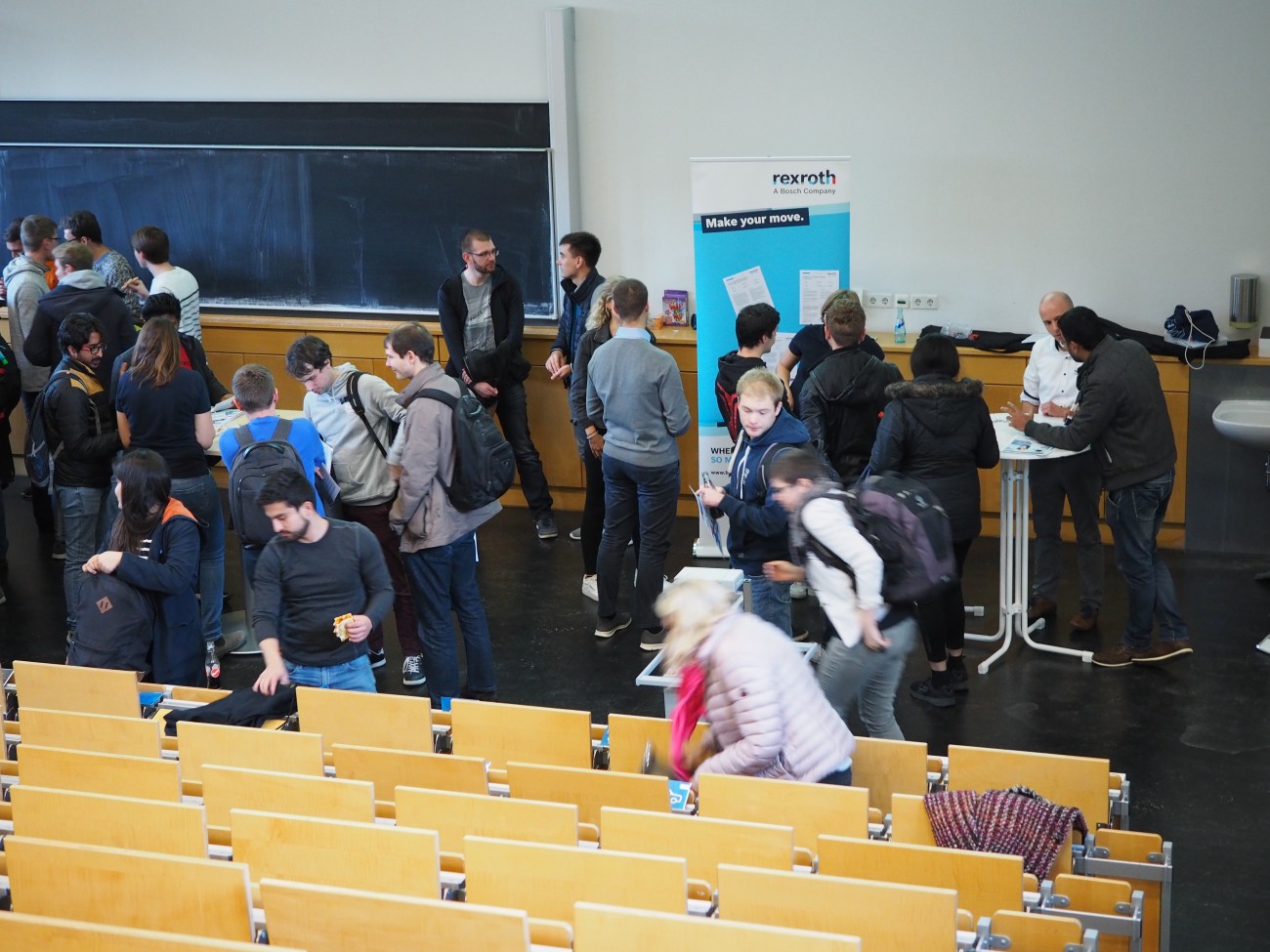TU Darmstadt welcomes grants from businesses, foundations and citizens, and it actively seeks to attract such funds.
TU Darmstadt commits to dealing with sponsors and donors sensitively and responsibly. In seeking to attract private grants, it places utmost importance on transparency, freedom of research and teaching, and independence from economic and other interests, and it rejects any and every form of influence. TU Darmstadt has documented this voluntary commitment in a code of conduct.
The guidelines on sponsorship activities (opens in new tab) , effective since 2012, point the way. These state: "Sponsorship must be visible to the public. Full transparency regarding the extent and type of sponsorship and the sponsors themselves is essential to avoid bias on the part of the public sector. For this reason, “sponsorship requires a contractual agreement before the grant is accepted” and it must be agreed on and coordinated within the TU.
For projects with a volume of more than 20,000 euros, the Vice President, Administration and Financial Affairs, signs the contracts.
Sponsorship is a form of targeted, contractually agreed cooperation between a giver and a receiver. The sponsor provides the sponsored party with money, goods, services or non-cash benefits and the sponsored party grants the sponsor a contractually agreed service in return. The giver uses sponsorship as an instrument for marketing, advertising and image management purposes. The aim is public communication, such as at events, on flyers or on the internet.
Depending on the kind of sponsoring agreement (active or passive) it might be classified as commercial sponsorship and might thus be subject to VAT taxation.
In the case of donations, the principle of a service in return is strictly excluded. Donations are contributions of money or goods that a person, organisation or company provides voluntarily and free of charge for the promotion of non-profit interests (e.g. research and teaching at a university). The university is not obliged to provide services in return, nor are these contractually agreed. A donor simply makes a donation and does not act for company benefit or for a non-cash service in return. They often expect absolute confidentiality or very modest publicity.
In case of donations in kind (e.g. machinery, laboratory equipment) TU Darmstadt is only allowed to issue a receipt of the donation if the donor has signed a notice of intent.
For the sponsored party, i.e. the university, it is crucial to know whether it is granting communicative services in return in a more “passive”, reserved form or performing them in an “active” way through emphatic public communication. In the first case, TU Darmstadt does not have to pay any tax. In the second case, the services can be classified as commercial sponsorship activities, in which case the university has to pay sales tax, among other things, on the revenue obtained.
Differences between “active” and “passive” sponsorship:
Examples of “passive”, “tolerable” involvement of the sponsored party in communication:
- Brief thanks in writing, e.g. in a brochure or event flyer or on a TU Darmstadt web page
- A brief reference to the sponsor’s support, with their name mentioned and/or a modest graphic representation of their logo, e.g. on a poster or as an unlinked image on TU Darmstadt’s website
- Release of the name and, if applicable, provision of a logo of the sponsored party and the logo of TU Darmstadt to the sponsors for appropriate promotional purposes
- Example of a joint symposium: the university and the sponsor make reference to the event in their publications and on their websites for the purpose of information and incorporate each other’s logo on their websites without linking it
Examples of “active”, emphatic involvement of the sponsored party in PR activities:
- Clearly emphasised references to the sponsor on flyers, posters and the like
- References to products of the sponsor, or advertisements placed in the sponsored party’s brochures; product placement in the context of a TU event
- The possibility of a trade fair stand being set up by the sponsor
- Placing a link or putting the sponsor’s logo on the TU’s website through which one is taken to the home page or other web pages of the sponsor
- A commitment to the sponsor to compile and publish media releases with promotional contents as a university
- Naming an event after a sponsor
TU Darmstadt does not allow commercially active companies to display the TU logo (or use the logo with a link back to the TU’s website) on company websites or in their printed publications – unless this is regulated within the context of contractual cooperation, such as in the form of sponsorship.
Why? TU Darmstadt’s logo is registered and recorded at the German Trademark Office. It is thus protected by law and has a financially quantifiable advertising value. Anyone who wants to advertise with us has to pay for it, including all the tax regulations. This can be arranged within the context of a cooperation agreement.
According to the case law of the fiscal courts, displaying the logo with or without a link (in this case to the TU Darmstadt website) on a commercial company website is an advertising service, which is taxable for TU Darmstadt as revenue. In addition, providing the logo to a company free of charge could entail an infringement of EU state aid law since TU Darmstadt as a corporation under public law would be granting the company a competitive advantage.
The TU Darmstadt logo is also not released for use in a pure supplier relationship. Suppliers to TU Darmstadt are permitted to name TU Darmstadt as a customer – but only with the full name, without any abbreviation, without the logo and without a link to TU Darmstadt’s website – all of that would be advertising. For this reason, TU Darmstadt also does not issue letters of reference.
Both of these options are possible if they are agreed on within the context of a contractual agreement with your sponsor. The Science Communication Centre is happy to provide the Athena logo in the required file format on request.
Within the context of a contractual agreement with your sponsor, this is possible as a service in return. Please take note of the information on “passive” and “active” sponsorship under the question “What am I allowed to and able to guarantee my sponsorship partner as services in return? What tax-related implications need to be considered in the case of sponsorship projects?” Depending on the case in question, incorporate the sponsor’s logo on your web page either with or without a link, or create an active link to your sponsor’s web page.
Please also take note of the guidelines for TU Darmstadt’s online presence („Das Bild der TU Darmstadt im Web“), which have been approved by the university’s Executive Board. The chapter on sponsorship and advertising says:
“As a basic principle, TU Darmstadt does not conduct any commercial advertising on the web pages that it is responsible for and has created itself. Incorporating active links to external partners (e.g. company logos or URLs), to any other companies, service institutions, etc., is a form of sponsorship and requires a written agreement. In this, the appropriate organisational unit of the university and its partner agree, among other things, on the extent and duration of the services provided and the services provided in return. Editorially mentioning partners from business, non-university research, etc., is, of course, possible for reference purposes."
Link on this topic:
TU Darmstadt offers a central job portal, Stellenwerk.
Contact Stellenwerk:
- info@stellenwerk.de
- telephone: 0800 210 05 62 (free of charge for German fixed line and mobile network)
If you put advertisements from companies or organisations, for example, online on your web pages, you are departing from the contractually regulated framework of Stellenwerk and granting companies an advantage. That is problematic, since it can give the impression that you are allowing yourself to be influenced for promotional interests. You may, of course, continue to freely publish vacant positions, internship places, etc., that are available in your department or at TU Darmstadt.
Against this background, TU Darmstadt’s Executive Board has approved a binding “Netiquette” that is intended to ensure greater transparency and to protect non-central TU web editors from involvement in advertising or a form of active sponsorship and the resulting consequences.
Anyone uploading external job advertisements to TU web pages must observe the following “Netiquette” criteria:
- The job advertisement exists as a pdf document
- It has a neutral graphic design, purely text-based plus the company logo
- There are no active links to the company’s web pages – including in the PDF document itself
For creating the PDF document pleas use this Word template or pass it on to external third parties .
The rooms can be requested or hired by means of a form in accordance with TU Darmstadt’s general rental terms and conditions.
Links on this topic:
No. All forms of sponsorship services for courses at TU Darmstadt are barred in order to avoid any appearance of influence.
Offers by sponsors that are clearly distinguishable from courses in terms of timing and contents are, of course, fundamentally possible – for example, distinctions, receptions, participation on a jury and the like.
Your contacts for
- General questions concerning sponsorship: Inken Bergenthun
- Legal issues related to tax and donations: Wolfgang Selzer
Below you will find templates for contracts from TU Darmstadt especially for sponsoring. These have already been released by Directorate VI.
Due to the abundance of different wishes that sponsors and recipients have, the relationship structures that have evolved and the different cultures, there is no “ready-made” agreement. Attached you can find a checklist with suggestions to help you draft the right sponsorship agreement for you:
Make the sponsorship agreement as transparent as possible. Sponsorship agreements must always be in written form and should clarify the following contents:
- definition of the sponsorship objectives and activities of the sponsor
- definition of what the sponsored party provides in return
Services in return are, for example, the printing of the logo and name of the sponsor on programmes and posters, references in public, title sponsorship, patronage, providing your own logo and name for use, references on business stationery.
Define also obligations (e.g. until when the sponsor should provide his logo for publication). - time dimension / duration of the agreement
- financial handling (i.e. who pays whom for what and by when)
- stating the net amount plus VAT on the basis of a cost estimation that covers the costs
- agreement about the (non-)influence of the sponsor on the contents of the sponsored party’s work
- liability
- termination
Also make sure that services of other TU departments (e.g. press and public relations) that are promised are clarified internally beforehand.
Contractual agreements are examined by Directorate VI Research. This is crucial to get a project number.
Your contacts for
- legal support and checking individual contractual agreements with sponsors
- issues related to sponsorship in third-party funded projects
| Name | Contact | |
|---|---|---|
|
B
| Carina Barth LL.M. | S1|01 |
|
K
| Stefanie Koch LL.M. | stefanie.koch1@tu-... +49 6151 16-57490 S1|01 |
|
A
| Sheela Atreya-Crass Ass.jur. | sheela.atreya-crass@tu-... +49 6151 16-57207 S1|01 |
|
G
| Claudia Galleguillos Pacheco Ass.jur. | claudia.galleguillos@tu-... +49 6151 16-57027 S1|01 |
|
K
| Hasibah Kolonko Ass. jur., LL.M. - parental leave - | hasibah.kolonko@tu-... 57294 S1|01 |
The project number always depends on the type of funding. It is crucial to successfully process the project according to accounting standards.
When all the essential points have been clarified (clarifying whether it is a donation, active or passive sponsorship, the drafting of the contract, etc.), you can request the opening of a project number from Directorate VI Research, Third-Party Funds Unit by application or by email.
The following documents must be included:
- for active sponsoring with exchange of service: sponsorship contract
- for passive sponsoring in the case of sponsoring without consideration: sponsor’s confirmation
- for donations – charitable purposes: donor’s declaration of intent
It is important that all details have to be clarified before the project starts. Please note that asking for a project number once the project has started means extra work for all parties.
Your contact for the assignment of account numbers of projects
The acceptance of donations and sponsorships should in no way influence our future decisions and activities at TU Darmstadt. And it should not have any restrictive effects if e.g. there are several offers from different sponsors.
Therefore:
- report all accepted donations (material or cash donations) to the financial accounting for posting.
- chose your sponsors in a neutral and objective way and document your reasons.
Your contact for corruption prevention
| Name | Contact | |
|---|---|---|

| Dipl.-Oec. Brigitte Koll | brigitte.koll@tu-... +49 6151 16-26499 S1|03 367a |


